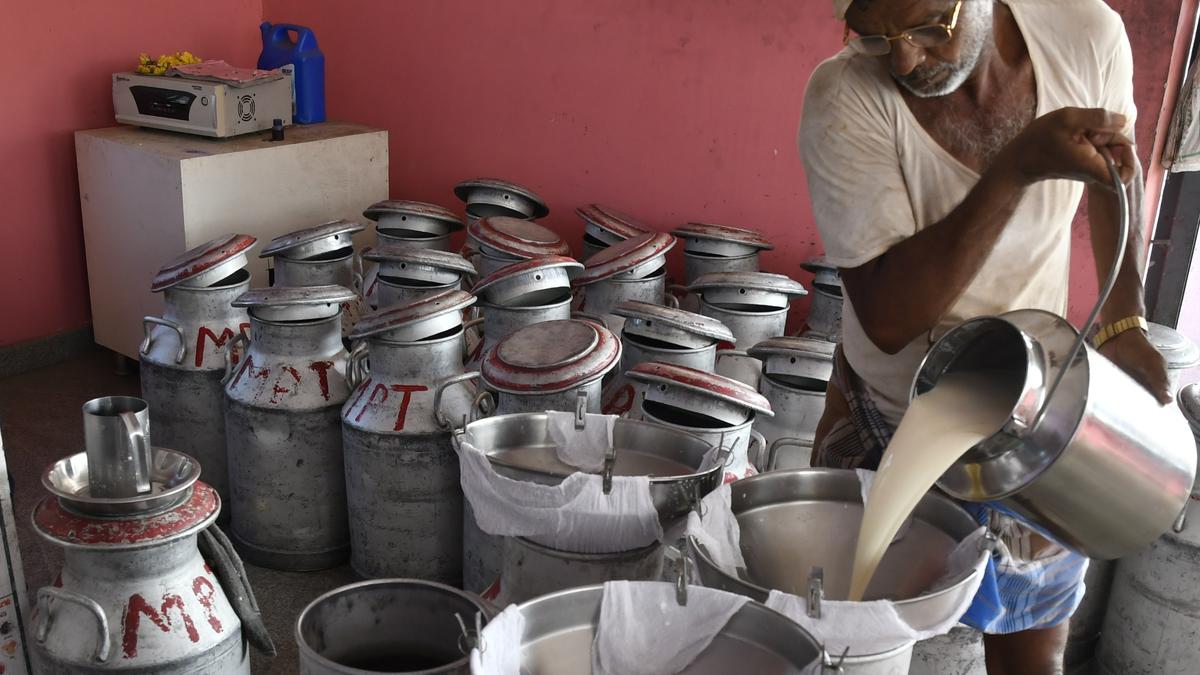
With rise in milk procurement and piling up of powder, district unions struggle to make up losses
The Hindu
Saddled with a huge stock of milk powder, which is piling up by the day owing to non-lucrative price in the market, the district milk unions are struggling to cut down losses with a few unions resorting to reduction in milk procurement price over the past few months. Currently, a stock of 15,000 tonne of milk powder is lying with the unions across the State, blocking their capital and restricting their ability to make fortnightly payments to farmers.
Saddled with a huge stock of milk powder, which is piling up by the day owing to non-lucrative price in the market, the district milk unions are struggling to cut down losses with a few unions resorting to reduction in milk procurement price over the past few months. Currently, a stock of 15,000 tonne of milk powder is lying with the unions across the State, blocking their capital and restricting their ability to make fortnightly payments to farmers.
The huge rise in the daily procurement of milk by the Karnataka Milk Federation (KMF) that has been pegged around 10% more than the last year has increased the average procurement across all district milk unions during this peak season. The average procurement of milk by KMF has been hovering between 90 lakh and 95 lakh litres a day this season. Last month, procurement even crossed one crore litre mark a day for the first time in 50 years of KMF’s existence. “The milk unions received increased quantity of milk as they had paid higher procurement price to farmers. These are now being reviewed by unions to cut down losses,” KMF sources said.
Earlier, KMF attempted to offset the losses by adding 50 ml milk to milk packets and charging an additional ₹2 per packet.
Currently, of the total milk procured, the federation sells about 62 lakh to 65 lakh litres daily in the fresh milk segment that includes milk, UHT milk, and curd, and consumes a couple of litres more for milk by products, including sweets and ice creams. “As much as 25 to 27 lakh litres of milk is currently going for conversion as milk powder daily. While the current milk powder rate in the market is between ₹205 and ₹210 a kg, the sustainable rate would be anything above ₹235 per kg”. The 15,000 tonne stock is after the weekly supply of about 900 tonne of milk powder to school and anganwadis under Ksheera Bhagya scheme.
While the Kolar Milk Union cut down the procurement price by ₹2 a litre in July, the Raichur-Koppal-Ballari Milk Union cut the price by ₹1.5 a litre a few days ago. Similarly, the Mandya Milk Union reduced the procurement price by 70 paise a litre in July. While the issue came up for discussion in the Bengaluru Milk Union Ltd. (BAMUL), it put off the decision and another round of discussion is expected to take place next week. The Mysuru Milk Union is also contemplating to reduce the procurement price.
The increasing stock of milk powder and unviable market rate is blocking the capital for milk unions, which are resorting to procurement rate cuts, sources said, adding that rate cuts are seasonal and normal cycle. For example, BAMUL alone has a stock of over 4,000 tonne of milk powder currently. Former BAMUL president S.N. Narasimhamurthy said that unions were suffering losses with the sale of milk powder as production cost was around ₹300 per kg.
Stating that the milk powder stock situation is not ‘alarming’, sources said that the powder will fetch good price from December as milk production comes down. “Realisation of good price for powder will take some time and we are hoping the powder price will move up. Till then, the unions have to sustain,” sources said.













